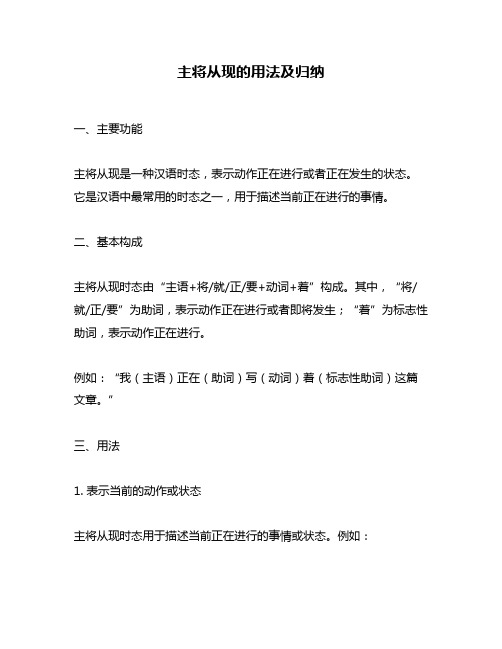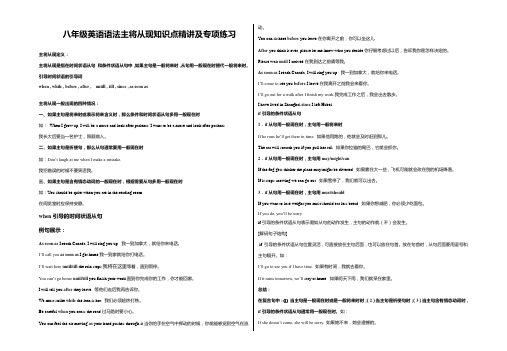初中主将从现的用法及归纳
初二上将来时,主将从现知识点讲解,练习,答案。

一般将来时1.用be doing表示将来:主要意义是表示按计划、安排即将发生的动作,常用于位置转移的动词。
如:go,come,leave,arrive等,也可用于其他动作动词。
We are having fish for dinner.We are moving to a different hotel the day after tomorrow.这种用法通常带有表示将来的时间状语,如果不带时间状语,则根据上下文可表示最近即将发生的动作。
A: Where are you going B: I am going for a walk. Are you coming with meA: Yes,I am just coming. Wait for me.2.用be going to do表示将来:主要意义,一是表示“意图”,即打算在最近的将来或将来进行某事。
Are you going to post that letterHow long is he going to stay hereI am going to book a ticket.另一意义是表示“预见”,即现在已有迹象表明将要发生或即将发生某种情况。
It’s going to rain.George is putting on weight; he is going to be quite fat.3. 用will/ shall do表示将来:一是表示预见You will feel better after taking this medicine.Do you think it will rain二是表示意图.I will not lend the book to you.Take it easy,I will not do it any longer.基本结构:She will come to have class tomorrow.Will she come to have class tomorrowShe won’t come to have class tomorrow.What will she do tomorrow肯定形式:①am/is/are going to + do;②will/shall + do.否定形式:①am/is/are going not to + do;②will/shall not + do.4.时间状语tomorrow the day after tomorrow tomorrow morning/afternoon/eveningnext year/week/month/hour in+段时间in the futurethis afternoon/Sunday/evening from now on how soon5.there will be 将有注意will的位置,不能there will have.一般疑问句:Will there be less pollution否定句:There won’t be less pollution.一般将来时练习一、用所给动词的一般将来时填空1. I ______(leave)in a minute. I ______(finish)all my work before I ______ (leave).2. —How long _____ you _____(study)in our country?—I _____(plan)to be here for about one more year.?—I _____(hope)to visit the other parts of your country.?—What ______ you ______(do)after you ______(leave)here?—I ______(return)home and ______(get)a job.3. I ______(be)tired. I ______(go)to bed early tonight.4. Mary’s birthday is next Monday, her mother _____(give)her a present.5. It is very cold these days. It ______(snow)soon.6. —_____ you _____(be)here this Saturday?—No. I ______(visit)my teacher.7. —______ I ______(get)you a copy of today’s newspaper?—Thank you.8. I am afraid there ______(be)a meeti ng this afternoon. I can’t join you.9. Mike ______(believe, not)this until he ______(see)it with his own eyes.10. Most of us don’t think their team ______(win).四、单项选择1. There __________ a meeting tomorrow afternoon.???????? A. will be going to?? ?B. will going to be C. is going to be??? D. will go to be2. Charlie ________ here next month.???????? A. isn’t working??? B. doesn’t working C. isn’t going to working??? D. won’t work 3. He ________ very busy this week, he ________ free next week.???????? A. will be; is??? B. is; is ???? C. will be; will be??? D. is; will be4. There ________ a dolphin show in the zoo tomorrow evening.???????? A. was??? B. is going to have C. will have??? D. is going to be5. –________ you ________ free tomorrow No. I ________ free the day after tomorrow.?????A. Are; going to; will??? B. Are; going to be; will C. Are; going to; will be???D. Are; going to be; will be6. Mother ________ me a nice present on my next birthday.???????? A. will gives??? B. will give ????? C. gives??? D. give7. – Shall I buy a cup of tea for you________. (不,不要。
主将从现 知识讲解 “主将从现”适用于什么样的从句中

主将从现知识讲解“主将从现”适用于什么样的从句中所谓的“主将从现”第一层次,即“主句用将来时(现在将来时和过去将来时),从句用一般时(一般现在时和一般过去时)”,这一层次也可以称作“初中层次”。
第二层次:“主将”中将来时有将来进行时,将来完成时,将来完成进行时,而“从现”中相应的时态也可能是现在进行时,现在完成时,现在完成进行时。
例如:If the snow has completely stopped, we will be playing with snow on the playground.如果雪能够完全停下来,我们将正在操场上玩雪呢!If it is snowing, we will have been walking in the snow for more than two hours.如果天一直在下雪,我们将在雪地里走了两个多小时了。
另外,引导条件状语从句的连接词(connector)还可以是unless, so long as, in case, on condition that, supposing that, provided that 等。
if引导条件状语从句的两种用法:第一种用法:当某事发生的可能性较大时,这种情况,有个十三字口诀:“主将从现,主过将从过,主现从现”。
即主句是一般将来时,从句用一般现在时;主句用过去将来时,从句用一般过去时;当主句中有can/can’t的话,则从句用一般现在时。
例如:If he has time, he will come tomorrow.If she finishes early, she can come back early.If you don’t do homework, the teacher will scold you.第二种用法:1.if从句还表示不可实现的条件或根本不可能存在的条件,也就是一种虚拟的条件或假设,从句多用一般过去时或过去完成时。
主将从现常见的有以下六种情况

常见的有以下六种情况:一、如果主句是将来时或表示将来含义时,那么条件和时间状语从句多用一般现在时如:When I grow up, I will be a nurse and look after patients/ I want to be a nurse and look after patients.我长大后要当一名护士,照顾病人。
二、如果主句是祈使句,那么从句通常要用一般现在时如:Don’t laugh at me when I make a mistake.我犯错误的时候不要笑话我。
三、如果主句是含有情态动词的一般现在时,根据需要从句多用一般现在时如:You should be quiet when you are in the reading room在阅览室时应保持安静。
四、如果if的条件状语从句遇到变换间接和直接时, 祈使句应用not to....如; She said not to close the window常见的时间状语从句的连词有:as soon as,when,while ,as,until等五、主将从现说的是在含有时间状语从句和条件状语从句的主从复合句中,如果主句的时态是一般将来时,那么从句要用一般现在时。
例如:I will tell him about it when he comes.If it is fine tomorrow, we will go outing.六、如果主句的时态是过去将来时,那么从句要用一般过去时。
例如:He said that he would have another try if he had the chance.I knew he could help me if he was free the next day.主要标志有:if 、unless 、until、when 、as soon as等If引导的条件句(if翻译成"如果"的时候)Ⅰ.(if 从句) 主句v./ v.三单will+v.Ⅱ. if+sb+v./ v.三单can+v.某事很可能发生,条件是可能存在的,主句中某种情况发生的概率也是很高的。
主将从现时间让步状语从句

主将从现时间让步状语从句
主将从现时间让步状语从句是一个复合句结构,在主句中,主语是主将,谓语是从现时间让步状语从句。
从现时间让步状语从句表示主将从现在的时间点开始,进行了某种动作或状态,虽然有一定的困难或限制,但还是按照计划或决定进行。
以下是符合题目要求的10个例子:
1. 虽然天气很冷,主将还是坚持每天早起晨跑。
2. 尽管时间紧迫,主将还是努力完成了任务。
3. 虽然路途遥远,主将仍然决定徒步穿越整个国家。
4. 尽管经济困难,主将依然坚持捐款帮助需要的人。
5. 虽然工作繁忙,主将还是抽出时间陪伴家人。
6. 尽管面临困难和挑战,主将不放弃追求自己的梦想。
7. 虽然身体疲惫,主将仍然坚持参加每周一次的羽毛球训练。
8. 尽管遭遇失败,主将没有失去信心,继续努力实现目标。
9. 虽然面临巨大的压力,主将仍然保持冷静,并做出了正确的决策。
10. 尽管遭遇了一系列的挫折,主将依然不放弃追求幸福和成功的努力。
以上例子展示了主将从现时间让步状语从句的用法,通过从句表达了主将在面临困难或限制的情况下仍然坚持或决定做某事的态度和行动。
这些例子中的主将可以是一个人,也可以是一个团体或组织。
通过这种句式的使用,可以强调主将的坚定意志和决心,展示他们
克服困难的能力和毅力。
主将从现的用法及归纳

主将从现的用法及归纳一、主要功能主将从现是一种汉语时态,表示动作正在进行或者正在发生的状态。
它是汉语中最常用的时态之一,用于描述当前正在进行的事情。
二、基本构成主将从现时态由“主语+将/就/正/要+动词+着”构成。
其中,“将/就/正/要”为助词,表示动作正在进行或者即将发生;“着”为标志性助词,表示动作正在进行。
例如:“我(主语)正在(助词)写(动词)着(标志性助词)这篇文章。
”三、用法1. 表示当前的动作或状态主将从现时态用于描述当前正在进行的事情或状态。
例如:- 我们现在正在看电影。
(表示目前正在看电影)- 他们正在讨论这个问题。
(表示目前正在讨论)- 我们正坐在公园里享受阳光。
(表示目前正在公园里享受阳光)2. 表示即将发生的动作主将从现时态还可以用于表达即将发生的事情。
例如:- 我们明天要去旅游。
(表示明天计划要去旅游)- 他马上就要来了。
(表示他即将到来)- 我们马上就要出发了。
(表示我们即将出发)3. 表示动作的持续性主将从现时态还可以用于表示动作的持续性。
例如:- 我们一直在等你。
(表示等待的动作一直持续)- 他正在学习英语。
(表示学习英语的动作正在进行)- 我们正走着路。
(表示走路的动作正在进行)4. 表示动作的结果主将从现时态还可以用于表示动作的结果。
例如:- 他努力学习着,终于考上了大学。
(表示努力学习最终取得了成功)- 我们一直在努力工作着,终于实现了我们的目标。
(表示努力工作最终取得了成功)四、注意事项1. 主将从现时态只能用于描述正在进行或者即将发生的事情,不能用于描述已经完成或者过去发生的事情。
2. 主将从现时态中,“将/就/正/要”为助词,不能省略。
3. 主将从现时态中,“着”为标志性助词,如果没有特殊需要,不宜过多使用。
五、总结主将从现是汉语中最常用的时态之一,用于描述当前正在进行或者即将发生的事情。
它由“主语+将/就/正/要+动词+着”构成,常用于表达动作的进行、即将发生、持续性和结果。
初中英语的三大法宝(1):“主将从现”

初中英语的三⼤法宝(1):“主将从现”在初中的英语学习中,有三个被⽼师反反复复强调、或者反反复复操练的知识,如图:说它们是“法宝”,是因为这些基本原则为后边的语法学习奠定了基础,它有点像数学的基本原理/公式,其他的诸多所谓“规则”都是在这个基础上推演出来的。
今天先看第⼀个:主将从现。
这个总结,很有中国⽼师的智慧。
主将从现——主句⽤现在将来时;时间或条件状语从句⽤⼀般现在时。
例如:If you work hard, you will get a promotion.如果你努⼒⼯作,你就会升職。
推理拓展⼀:所谓将来,就是尚未发⽣。
那么除了所谓“将来时”,以下形式都具备“将来”意义。
[1] 情态动词:⽆论可能(may)、必要(must、should)还是能⼒(can)例如:If you believe in yourself enough, and know what you want, you should make it happen.(改变⾃⽜姐的歌词)如你相信⾃⼰、知道⾃⼰要什么,就去让美梦成真。
[2] 动词不定式短语:be to do;be aboutto do,以及不定式做的各种成分。
⽐较Three railways constructed, two railways being constructed, and one railway to be constructed. (三条已建成的、两条正在建的、⼀条将要建的轨道。
)例如:You are to wait here in this room until I return.你需在此等待,直到我回来。
(注意从句时态——Ireturn)⼜如:The best way to predict the future is to create it.预测未来的最佳⽅案就是创造未来。
(定语to predict和表语的to create都是未发⽣的)[3] 祈使句、建议命令句例如:Help others achieve their dreams and you will achieve yours.帮助他⼈实现他们的梦想,⽽你也将因此实现你⾃⼰的梦想。
主将从现常见的有以下六种情况

常见的有以下六种情况:一、如果主句是将来时或表示将来含义时,那么条件和时间状语从句多用一般现在时如:When I grow up, I will be a nurse and look after patients/ I want to be a nurse and look after patients。
我长大后要当一名护士,照顾病人。
二、如果主句是祈使句,那么从句通常要用一般现在时如:Don’t laugh at me when I make a mistake.我犯错误的时候不要笑话我。
三、如果主句是含有情态动词的一般现在时,根据需要从句多用一般现在时如:You should be quiet when you are in the reading room在阅览室时应保持安静.四、如果if的条件状语从句遇到变换间接和直接时,祈使句应用not to。
.。
如; She said not to close the window常见的时间状语从句的连词有:as soon as,when,while ,as,until等五、主将从现说的是在含有时间状语从句和条件状语从句的主从复合句中,如果主句的时态是一般将来时,那么从句要用一般现在时。
例如:I will tell him about it when he comes。
If it is fine tomorrow,we will go outing。
六、如果主句的时态是过去将来时,那么从句要用一般过去时。
例如:He said that he would have another try if he had the chance.I knew he could help me if he was free the next day。
主要标志有:if 、unless 、until、when 、as soon as等If引导的条件句(if翻译成”如果"的时候)Ⅰ。
八年级英语语法主将从现知识点精讲及专项练习

八年级英语语法主将从现知识点精讲及专项练习主将从现定义:主将从现是指在时间状语从句和条件状语从句中,如果主句是一般将来时,从句用一般现在时替代一般将来时。
引导时间状语的引导词when , while , before , after , untill , till , since , as soon as主将从现一般出现的四种情况:一、如果主句是将来时或表示将来含义时,那么条件和时间状语从句多用一般现在时如:When I grow up, I will be a nurse and look after patients/ I want to be a nurse and look after patients.我长大后要当一名护士,照顾病人。
二、如果主句是祈使句,那么从句通常要用一般现在时如:Don’t laugh at me when I make a mistake.我犯错误的时候不要笑话我。
三、如果主句是含有情态动词的一般现在时,根据需要从句多用一般现在时如:You should be quiet when you are in the reading room在阅览室时应保持安静。
when引导的时间状语从句例句展示:As soon as I reach Canada, I will ring you up. 我一到加拿大,就给你来电话。
I’ll call you as soon as I get home.我一到家就给你打电话。
I’ll wait here until/till the rain stops.我将在这里等着,直到雨停。
You can’t go home until/till you finish your work.直到你完成你的工作,你才能回家。
I will tell you after they leave. 等他们走后我再告诉你。
We must strike while the iron is hot. 我们必须趁热打铁。
- 1、下载文档前请自行甄别文档内容的完整性,平台不提供额外的编辑、内容补充、找答案等附加服务。
- 2、"仅部分预览"的文档,不可在线预览部分如存在完整性等问题,可反馈申请退款(可完整预览的文档不适用该条件!)。
- 3、如文档侵犯您的权益,请联系客服反馈,我们会尽快为您处理(人工客服工作时间:9:00-18:30)。
初中主将从现的用法及归纳
初中主将从现(Simple Present)是英语语法中主要时态之一。
它用来表达现在的状态、习惯、经常性的行为或真理等。
其基本结构为主语+谓语。
1. 表示实际发生的事情或客观存在的状态
例句:I live in New York.(我住在纽约。
)
He speaks Chinese fluently.(他擅长讲中文。
)
2. 表示经常性的动作或习惯
例句:She eats breakfast at 7 every morning.(她每天早上7点吃早餐。
)
They always go jogging on weekends.(他们每个周末都去慢跑。
)
3. 表示含义广泛的真理、事实或规律
例句:The earth orbits around the sun.(地球绕着太阳运转。
)
Water boils at 100 degrees Celsius.(水在100摄氏度沸腾。
)
4. 表示主观感受或态度
例句:I love watching movies.(我喜欢看电影。
)She hates getting up early.(她讨厌早起。
)
5. 表示命令、建议、要求等意愿
例句:Don’t forget your keys.(别忘了你的钥匙。
)Please open the window.(请打开窗户。
)
6. 表示现在进行时
例句:I am reading a book now.(我正在看书。
)They are studying for the test.(他们正在准备考试。
)初中主将从现的用法总结如下:
1. 表示现实、事实或状态
2. 表示经常性的行为和习惯
3. 表示真理、事实或规律
4. 表示主观感受和态度
5. 表示命令、建议、要求等意愿
6. 表示现在进行时
初中主将从现的否定形式一般在谓语前面加上“don’t”或“doesn’t”,疑问形式则将“do”或“does”提到主语前面。
其特殊疑问句可通过疑问词引导:what, when, where, why, how等。
以“live”(居住)为例:
肯定句:I live in Beijing.(我住在北京。
)
否定句:I don’t live in Beijing.(我不住在北京。
)
一般疑问句:Do you live in Beijing?(你住在北京吗?)
特殊疑问句:Where do you live?(你住在哪里?)
初中主将从现的用法举例
1. 凯莉每天早上7点准时起床。
Kylie gets up at 7 every morning.
2. 狗是最好的朋友,它们总是忠诚可靠。
Dogs are the best friends, they are always loyal.
3. 凡事有其两面性,学习也不例外。
Everything has two sides, and learning is no exception.
4. 我们的老师总是给我们提供最好的教育资源。
Our teachers always provide us with the best educational resources.
5. 我们应该珍惜每一天,享受生活。
We should cherish every day and enjoy life.
6. 我们每年都会举行一次团队建设活动。
We hold a team building activity once a year.
初中主将从现的练习
1. 补全下列句子:
a. Mike __________ ice cream every day. (每天都吃冰淇淋。
)
b. She ____________ in London now.(她现在住在伦敦。
)
c. They ____________ the bus to school every day.(他们每天坐公车上学。
)
d. The sun __________ in the east and sets in the west.(太阳从东边升起西边落。
)
2. 根据所给的情景,使用初中主将从现形式填空
a. - What time do you usually get up?
- I ______________ at 6:30 in the morning.(我通常早上6点半起床。
)
b. - Where do they usually go on vacation?
- They _______________ to the beach every summer.(他们每个夏天通常去海边。
)
c. - Does your sister like sports?
- Yes, she _______________ tennis and basketball.(是的,她喜欢打网球和篮球。
)
d. - Please turn off the TV.
- OK, I _____________ it now.(好的,我现在把电视关掉。
)
初中主将从现的练习答案
1. 补全下列句子:
a. Mike eats ice cream every day.(每天都吃冰淇淋。
)
b. She lives in London now.(她现在住在伦敦。
)
c. They take the bus to school every day.(他们每天坐公车上学。
)
d. The sun rises in the east and sets in the west.(太阳从东边升起西边落。
)
2. 根据所给的情景,使用初中主将从现形式填空
a. - What time do you usually get up?
- I get up at 6:30 in the morning.(我通常早上6点半起床。
)
b. - Where do they usually go on vacation?
- They go to the beach every summer.(他们每个夏天通常去海边。
)
c. - Does your sister like sports?
- Yes, she likes playing tennis and basketball.(是的,她喜欢打网球和篮球。
)d. - Please turn off the TV.
- OK, I will turn it off now.(好的,我现在把电视关掉。
)。
